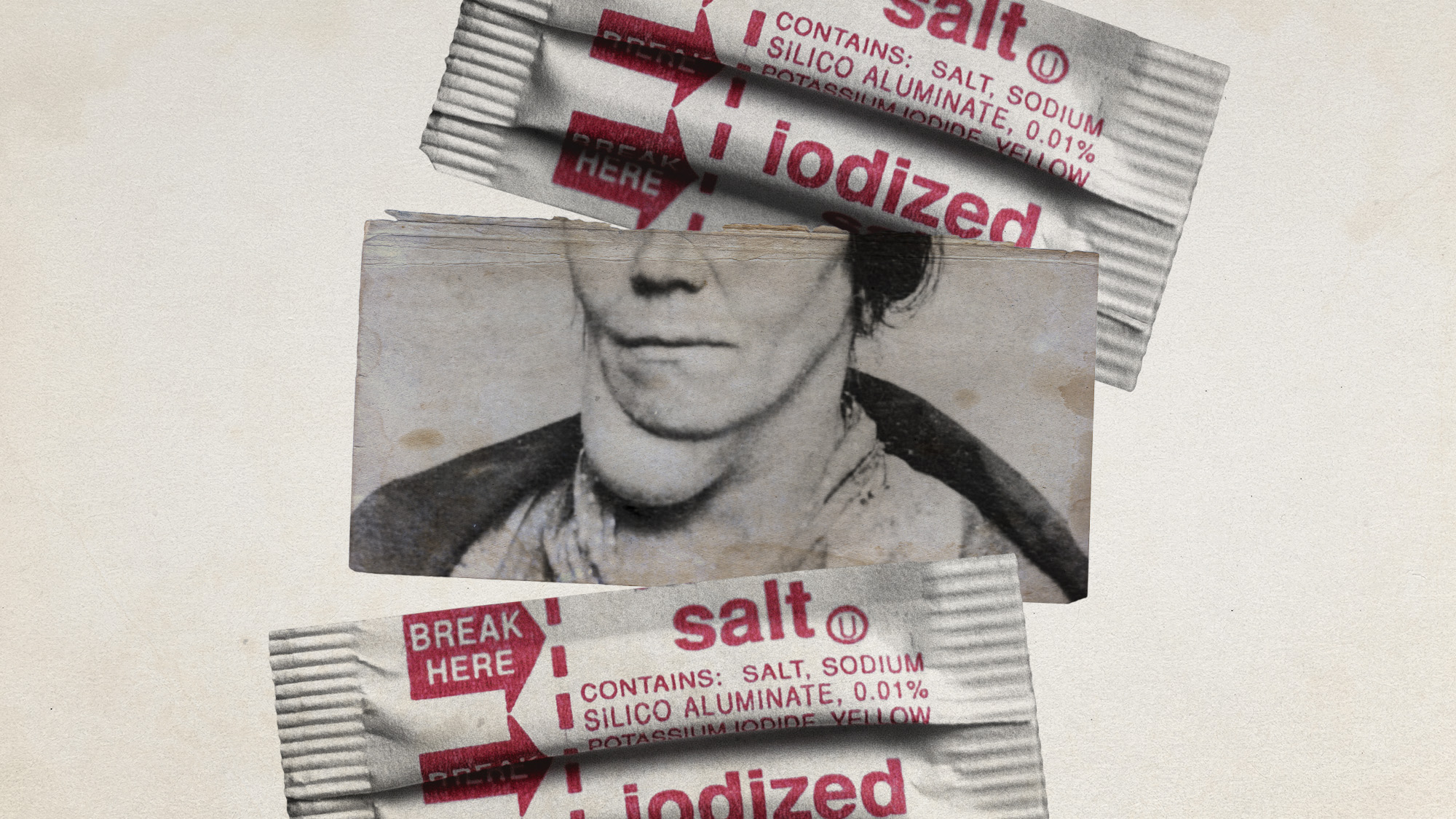A growing iodine deficiency could bring back America's goiter
Ailment is back thanks to complacency, changing diets and a lack of public-health education

A free daily email with the biggest news stories of the day – and the best features from TheWeek.com
You are now subscribed
Your newsletter sign-up was successful
"A century ago, much of northern America was known as the goiter belt," said The Economist.
A lack of natural iodine in the soil and water, and an iodine-poor diet, led to the "characteristic neck swellings": enlarged thyroid glands. But after iodine supplements were shown to help prevent them, iodised salt was "rolled out" in 1924. By the 1940s, goiters had all but "vanished".
Now, thanks to complacency, changing diets and a "lack of public-health education", iodine deficiency may be making a comeback in America.
The Week
Escape your echo chamber. Get the facts behind the news, plus analysis from multiple perspectives.

Sign up for The Week's Free Newsletters
From our morning news briefing to a weekly Good News Newsletter, get the best of The Week delivered directly to your inbox.
From our morning news briefing to a weekly Good News Newsletter, get the best of The Week delivered directly to your inbox.
A historical curiosity
Iodine deficiency causes more than just "cosmetic" issues, said The Washington Post. Iodine is an essential element for humans: it helps the thyroid produce hormones that regulate the metabolism, crucial for nutrition and cognitive development.
It's especially key for babies. Iodine deficiency in pregnant and lactating women can cause miscarriage and stillbirths, and often leads to "children with severely diminished IQ" and other cognitive impairments. It is the leading global cause of "preventable intellectual disability".
In the 1920s, between 70% to 100% of schoolchildren in parts of Michigan, Minnesota and Wisconsin had goiters. In Michigan, the "epicentre of the crisis", about 31% of men were deemed unfit for the First World War draft because of a goiter too large to allow them to button a uniform.
But an Ohio study from 1917 to 1919 found that schoolgirls given iodine supplements had a "hugely reduced rate of goiters". In 1922, a Michigan paediatrics professor recommended the ionisation of salt: a "near-ubiquitous food product that would quickly reach a large percentage of the population". (Adding iodine to table salt was already common practice in Switzerland.)
A free daily email with the biggest news stories of the day – and the best features from TheWeek.com
Two years later, the state voted to recommend salt containing 0.01% sodium iodide, which had "virtually no effect on its taste". By the autumn, iodised salt was distributed across the US, quickly becoming a part of the American diet. But now, the American goiter "either goes ignored or exists merely as a historical curiosity".
A silent health epidemic
This year, the world celebrated 100 years of salt iodisation, a "tremendous public-health achievement", said Healio. But in the US, much of the history of iodine deficiency "has been forgotten".
Iodine deficiency has "re-emerged" among pregnant Americans over the past 15 years. A 2021 study found that about a quarter of US pregnant women and about half of non-pregnant women had below the recommended level of iodine.
US doctors now recommend daily iodine supplements for pregnant women (who need 50% more iodine than other women to support their babies' growth).
Salt iodisation was never federally mandated and only about half the table salt sold in the US is iodised. Alternatives like sea salt or pink Himalayan salt tend not to contain iodine. Processed foods – the source of an ever-increasing majority of the salt in people's diets – are generally free of the mineral.
Changing habits have also played a part. Dairy, meat and white fish are key sources of iodine, but decreasing demand, alongside the growing popularity of dairy milk substitutes like soy and oat, "may cause a further decline". According to one 2022 study in the British Journal of Nutrition, less than a third of dairy alternatives are iodised.
This problem goes far beyond America. A "groundbreaking" study published in The Lancet last month revealed a "shocking truth", said the Daily Express: that more than 5 billion people – 68% of the world's population – weren't getting enough iodine, a "silent health epidemic".
Most live in places with low levels of natural iodine, such as sub-Saharan Africa and Southeast Asia. But iodine deficiency is also "still a widespread problem" in Europe, according to the World Health Organization. Since the last WHO report on iodine deficiency (published in 2007) a "wealth of new data" on iodine has become available. But only about 40% of European countries have mandated salt-iodisation policies. The UK, for example, does not typically use iodised salt.
This nutritional gap is "fixable at a modest cost", said The Economist. Mandating salt iodisation or iodising dairy alternative milks could help reduce deficiency. "America's goiter belt has been thrown off before: similar approaches could stop it returning."
Harriet Marsden is a senior staff writer and podcast panellist for The Week, covering world news and writing the weekly Global Digest newsletter. Before joining the site in 2023, she was a freelance journalist for seven years, working for The Guardian, The Times and The Independent among others, and regularly appearing on radio shows. In 2021, she was awarded the “journalist-at-large” fellowship by the Local Trust charity, and spent a year travelling independently to some of England’s most deprived areas to write about community activism. She has a master’s in international journalism from City University, and has also worked in Bolivia, Colombia and Spain.
-
 What is the endgame in the DHS shutdown?
What is the endgame in the DHS shutdown?Today’s Big Question Democrats want to rein in ICE’s immigration crackdown
-
 ‘Poor time management isn’t just an inconvenience’
‘Poor time management isn’t just an inconvenience’Instant Opinion Opinion, comment and editorials of the day
-
 Bad Bunny’s Super Bowl: A win for unity
Bad Bunny’s Super Bowl: A win for unityFeature The global superstar's halftime show was a celebration for everyone to enjoy
-
 Scientists are worried about amoebas
Scientists are worried about amoebasUnder the radar Small and very mighty
-
 Growing a brain in the lab
Growing a brain in the labFeature It's a tiny version of a developing human cerebral cortex
-
 Metal-based compounds may be the future of antibiotics
Metal-based compounds may be the future of antibioticsUnder the radar Robots can help develop them
-
 Europe’s apples are peppered with toxic pesticides
Europe’s apples are peppered with toxic pesticidesUnder the Radar Campaign groups say existing EU regulations don’t account for risk of ‘cocktail effect’
-
 A Nipah virus outbreak in India has brought back Covid-era surveillance
A Nipah virus outbreak in India has brought back Covid-era surveillanceUnder the radar The disease can spread through animals and humans
-
 How space travel changes your brain
How space travel changes your brainUnder the Radar Space shifts the position of the brain in the skull, causing orientation problems that could complicate plans to live on the Moon or Mars
-
 Mixed nuts: RFK Jr.’s new nutrition guidelines receive uneven reviews
Mixed nuts: RFK Jr.’s new nutrition guidelines receive uneven reviewsTalking Points The guidelines emphasize red meat and full-fat dairy
-
 Trump HHS slashes advised child vaccinations
Trump HHS slashes advised child vaccinationsSpeed Read In a widely condemned move, the CDC will now recommend that children get vaccinated against 11 communicable diseases, not 17